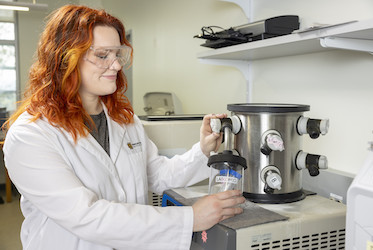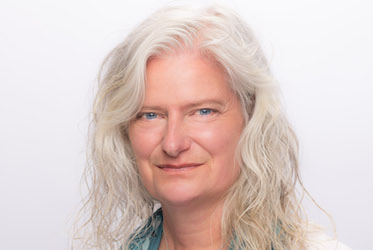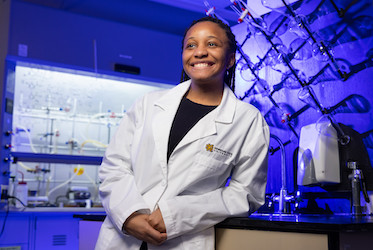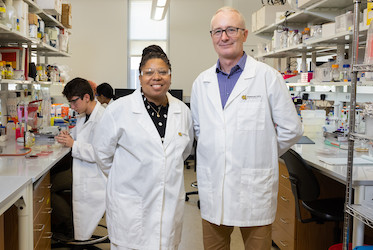
Fully Charged
KENNESAW, Ga. | Feb 21, 2019
Student’s research extends battery life
|
|
|
|---|---|
|
|
|
|
|
Each year, thousands of undergraduates from all over the United States participate in the National Conference on Undergraduate Research (NCUR). NCUR, the largest conference dedicated to undergraduate research in the country, features work from some of the nation’s best and brightest students. Kennesaw State will serve as the host institution for NCUR 2019 April 11-13. Zeljka Zec, of Kennesaw, is one of more than 400 KSU students who will present their research at NCUR. |
Zeljka Zec, originally from Croatia, had little understanding of undergraduate research when she first arrived at Kennesaw State, but when a biology professor asked students if they’d like to volunteer to conduct research in the lab, she jumped at the opportunity.
It was the chemistry major’s first foray into undergraduate research. She volunteered a few hours each week, and the experience sparked her enthusiasm for doing more research, but this time within her field of chemistry. Today, her research efforts now focus on a specific interest area – alternative materials in rechargeable batteries.
Zec, an Honors College student who will graduate in December, hopes her study will help to improve and extend battery life and performance. She will present her research at NCUR for the first time.

What is your research area?
I conduct research dealing with nanomaterials design, synthesis and characterization methods in the Inorganic Chemistry Lab. Currently, I am investigating alternative materials to coat a battery’s cathode – the positive charge of a battery. When a battery discharges, the element it is typically coated in – manganese oxide – dissolves, causing a loss of active material and altering the battery performance during the charging phase.
Using a homogeneous sol-gel sodium dioxide coating, we are able to control the thickness of the coatings to lessen the cathode breakdown, which is one of the main limitations of manganese dioxide-based cathodes in aqueous batteries. We are also analyzing the surface of silica-coated manganese dioxide cathodes.
To our knowledge, there is no established method for surface coatings to prevent the cathode’s breakdown. Our research will shed light on surface effects with insoluble oxide layers, which should ideally mitigate the dissolution. This could benefit all different battery types that have the same problem.
Who (and/or what) has been your inspiration for your research?
I have the great privilege of working with my mentor, Dr. Altug Poyraz, assistant professor of inorganic chemistry, who has been a huge inspiration for me.
Since the first day in the lab, he has always shown me his constant dedication in the research he does. When I first started working in lab, I was afraid of making mistakes or failing at my project. However, Dr. Poyraz taught me that mistakes are a normal part of growth and learning, especially in the science field, where everything is about trial and error with experiments. He taught me to learn from those mistakes and implement the knowledge gained from them.
Dr. Poyraz always goes above and beyond to share his knowledge and has patience to explain to me anything that I need more clarification on. Not only has he shown me what hard work, perseverance, discipline and devotion means, but he has also helped me become more confident and independent in my scientific abilities. Seeing his success makes me want to work more toward mine and inspires me every day to do the best I can to achieve my goals and dreams.
What motivated you to get involved with undergraduate research and NCUR?
As a first-generation student, I didn’t know anything about doing research. During my junior year, one of my biology lab professors asked if anyone was willing to help her with research. I volunteered to commit a few hours every week to conduct biological data analysis in her field.
After a few months, I realized that I wanted to pursue this kind of commitment in chemistry research since I always enjoyed the hands-on experience in my chemistry lab classes. I started talking to different upper-level professors to see what I would like to do best.
Getting involved in undergraduate research has been one of my top highlights at KSU because it is so rewarding to get to work on your project on your own time and get to be the main person to contribute to the research and get results that you can showcase at conferences like NCUR. It is also a great experience to work with other team members in my lab, where we can all learn, discover and benefit from each other.

What have you gained (or hope to gain) from your experience with NCUR?
I hope to gain new perspectives, ideas and feedback on how I apply my knowledge and skills. It is always a great feeling to be able to showcase my ongoing work and be able to explain to curious observers what an impact I am making by contributing my time, effort and passion into doing research to represent not only KSU and the science community but also first-generation, minority students. I’m also excited to be part of the Undergraduate Research NCUR Committee, where I have helped to organize and prepare everything for NCUR at KSU this year.
Although I haven’t presented directly at NCUR due to limited funding in the past, I have attended KSU’s Symposium of Student Scholars as well as SERMACS, a STEM-based research conference. It has been an amazing experience to present my work and see what kind of other smart, young minds these conferences bring together.
Attending different conferences has helped me gain potential ideas on how to continue and improve my research and how to change my perspective when faced with issues. I was also one of 15 undergraduate researchers to have breakfast with President Whitten to talk about my research.
What advice would you give to others about doing undergraduate research or participating in NCUR?
I believe everybody should take the opportunity to do undergraduate research because it brings so much knowledge, creativity and strong critical-thinking skills, which can bring success in whatever a student decides to do. Doing research serves as a trail to uncover new interests or interest areas outside of the typical classroom learning. The biggest advice is to not be afraid to reach out to professors and see what type of research they do.
By doing research, I became proficient in using published literature, critical thinking and time management skills as well as hands-on experience. My understanding of chemistry has dramatically increased, which has helped me do better in my classes and become more self-assured in the science environment.
Now more than ever, we need research leaders who are not afraid to step up in order to further move toward a prosperous and progressive future.
– Tiffany Capuano
Photos by David Caselli
Related Stories
A leader in innovative teaching and learning, Kennesaw State University offers undergraduate, graduate and doctoral degrees to its more than 45,000 students. Kennesaw State is a member of the University System of Georgia with 11 academic colleges. The university’s vibrant campus culture, diverse population, strong global ties and entrepreneurial spirit draw students from throughout the country and the world. Kennesaw State is a Carnegie-designated doctoral research institution (R2), placing it among an elite group of only 7 percent of U.S. colleges and universities with an R1 or R2 status. For more information, visit kennesaw.edu.



















